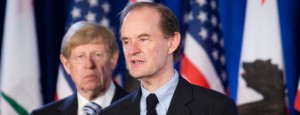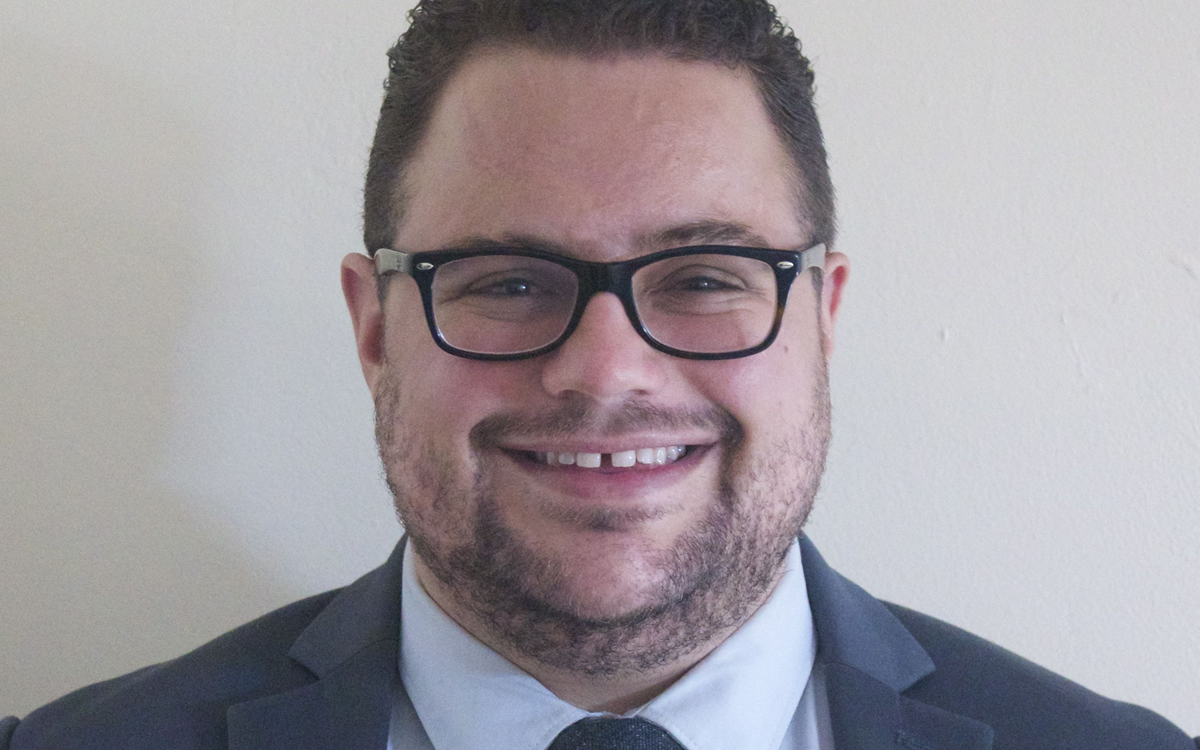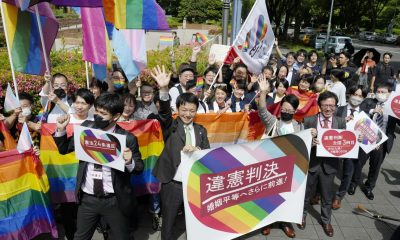National
Prop 8 case wraps up, ruling expected in weeks
Appeals could take years; may be destined for Supreme Court

Attorneys Ted Olson and David Boies (front) are waging the case against Proposition 8, which banned same-sex marriage in California. (Photo courtesy of Equal Rights Foundation)
Marriage equality supporters were focused this week on the closing arguments in a case that could end California’s ban on same-sex marriage and similar bans throughout the country.
In the case Perry v. Schwarzenegger, attorney Ted Olson, a former U.S. solicitor general for former President George W. Bush, was set to give his final arguments in favor of same-sex marriage on Wednesday, after Blade deadline.
The legal challenge, pending before Chief Judge Vaughn Walker of the U.S. District Court of Northern California, aims to invalidate Proposition 8, a ballot initiative in 2008 that ended same-sex marriage in the Golden State.
In a conference call last week with reporters, Olson made the case for same-sex marriage in California. He noted that the U.S. Supreme Court has “declared again and again” that being able to choose the person one wants to marry “is a fundamental right in this country.”
“It is vital to the opportunity for people to be a part of communities, of neighborhoods — to be able to join together in a committed relationship and to bond with one another in a relationship sanctioned by the state,” he said.
Olson compared Prop 8 to state laws banning interracial marriage, which the U.S. Supreme Court struck down in the 1967 case Loving v. Virginia, and said he was presenting the same arguments in the Perry case.
“The parents of our president of the United States would have committed a crime had they been married at the time our president was born,” Olson said.
Olson said Prop 8 is unconstitutional in part because the referendum created four separate classes of people in California with respect to marriage.
They are same-sex couples who married in California before Prop 8 passed and remain married; same-sex couples who cannot marry; same-sex couples who married in other jurisdictions and have full legal marriage rights in California; and opposite-sex couples whom Olson said can marry whomever those choose “even if they’re in prison, even if they’re child abusers, or even if they’re 90 years old.”
Olson litigated the case in partnership with David Boies, an attorney who’s also been involved in high-profile cases. The two men were on opposite sides of Bush v. Gore in 2000; Olson represented then-Republican presidential candidate Bush while Boies represented Democratic presidential candidate Al Gore.
Boies, who cross-examined defendant witnesses during the trial, said, “there isn’t any support” for the arguments advanced by proponents of Prop 8 during the trial.
Proponents of Prop 8, Boies said, presented several arguments that failed under examination, such as the purpose of marriage being procreation, that marriage has always been between one man and one woman, and that same-sex marriages could endanger opposite-sex marriages.
“None of the defendant witnesses supported those propositions, and, in fact, all of their witnesses who spoke on those issued ended up giving contrary testimony,” Boies said.
For example, he said, witnesses under examination acknowledged that procreation has never been a requirement for marriage and many societies in the past have allowed same-sex marriage, including for a time California after the state’s Supreme Court in 2008 ruled that same-sex nuptials were mandated under the state constitution.
“It was only the passage of Proposition 8 that took this right away from gay and lesbian couples even in California,” Boies said.
Additionally, Boies said defendants’ witnesses acknowledged on the stand that prohibiting LGBT couples from marrying “caused them serious damage, and caused the hundreds of thousands of children that those couples were raising serious damage.”
Boies also said defendants were unable to produce witnesses that could provide “a shred of evidence” that same-sex marriage endangers opposite-sex marriage.
“It’s a critically important case, but it’s one in which the facts really are not in dispute,” Boies said. “The other side doesn’t have a legal argument, they don’t have a factual argument — they got a circular bumper sticker for a case.”
Proponents of Prop 8 will also have an opportunity to offer remarks during closing arguments. Chuck Cooper, lead attorney for defendants, will represent those arguing for the court to uphold Prop 8.
In a statement, Jim Campbell, an attorney for Alliance Defense Fund, a conservative legal firm working on the case, said defendants would emphasize arguments they made throughout the trial.
“The team of attorneys defending Proposition 8 will highlight all the reasons why Proposition 8 is constitutional,” he said. “In doing so, they will emphasize the reasons why Proposition 8 is not only rational, but also why preserving marriage as one man and one woman is good social policy.”
Jennifer Pizer, marriage project director and senior counsel for Lambda Legal, predicated both sides in the Perry case would “survey the evidence” already presented during the trial.
She said Olson and Boies presented “a massive evidentiary record” before the court and expected them “to offer a structure for this mountain of relevant evidence that they have submitted.”
For proponents of Prop 8, Pizer said she expects attorneys to “make a mountain out of the barely noticeable molehill of evidence” that they’ve submitted.
She said much of the defendants’ evidence was submitted from individuals who weren’t qualified as experts, meaning they weren’t in court and qualified according to the rules and therefore not examined.
“The defendants offered into evidence a pile of articles without explanation of who the authors were or why any of their writings might be relevant to anything,” she said. “So I suspect that Chuck Cooper may refer to many of those documents as if they were relevant evidence, but they’re not.”
Pizer also predicted that the defendants would argue that the “anti-gay prejudice that infused and inspired the Prop 8 campaign” isn’t legally relevant to whether the initiative is constitutional. Still, Pizer said she believes this anti-gay bias was the sole purpose of Prop 8.
“The proponents of Prop 8 were inspired by anti-gay prejudice and they sent the voting public misinformation in a deliberate attempt to confuse and induce people to vote their prejudice into law — and they succeeded,” she said.
Pizer said Lambda was involved in the Perry case by filing two friend-of-the-court briefs in favor of the legal challenge to Prop 8 as well as providing resource assistance to plaintiffs in the case.
Earlier this month, Walker presented an 11-page list of questions he wanted attorneys on both sides of the case to answer during closing arguments. Among the topics for plaintiffs was a requested review of any empirical data showing that the availability of same-sex marriage reduces discrimination against LGBT people.
During the conference call, Olson said that such data can be found in the ballot label for Prop 8, which noted the measure “eliminates the rights for same-sex couples to marry.”
“You are not only stating that the state creates discrimination, but that the state sanctions discrimination — and sanctions the points of the attitudes — that bring about private discrimination,” Olson said. “It has always been the case that when the court eliminates state discrimination … that people open up and realize that what they’re doing themselves is not permissible.”
Another question was how the court could find Prop 8 unconstitutional without also invalidating the Defense of Marriage Act, the 1996 law prohibiting federal recognition of same-sex marriages.
Boies said the matter under consideration is different from DOMA because state law traditionally determines marriage in the United States, although some of the constitutional arguments against DOMA are similar to those against Prop 8.
“For all of the rights that are a matter of state law — which are the majority of rights that are involved — it is critical that people have the right to marry even if DOMA were to continue to exist,” Boies said.
Several observers following the case have predicted that Walker will rule in favor of plaintiffs, although how subsequent courts will rule on any appeal remains to be seen.
Pizer said she couldn’t predict how Walker will rule in the case, but noted that the questions he’s posed show a focus on “questions of causation.”
“He is focused on whether there are adequate government purposes and whether there’s a proper causal relationship between what Prop 8 actually does and goals that the state is actually permitted to have,” she said. “Advancing prejudice is never a proper government purpose.”
In response to a Blade inquiry on the timeline for the case, Olson said he expects a decision from Walker in the case within weeks of the closing arguments. The next step would be taking the case to the U.S. Court of Appeals for the Ninth Circuit.
Olson said he hopes that Walker will find Prop 8 unconstitutional and allow LGBT people to start marrying in California immediately, but noted that if he withholds institution of that decision, plaintiffs hope the Ninth Circuit would hear the case “in a hurry.”
“That’s probably a process that would take perhaps a year, although we moved through this case fairly rapidly so far,” Olson said.
The case could then be appealed to the U.S. Supreme Court. Olson said following the appeals court ruling, it would take six to eight months to get the case on the docket for the high court.
But Pizer said it’s difficult to determine how long the case would remain in the Ninth Circuit because it could first go before a three-judge panel — and then advance to an 11-judge panel.
“That’s a long way of saying it’s impossible to tell how long it would be between now and the Supreme Court,” she said. “It might be two years or three years. Anybody who gives you a prediction is making a guess.”
Asked whether the Supreme Court would examine only the constitutionality of Prop 8 or the validity of same-sex marriage bans throughout the country, Olson said the scope of the examination would be up to the Supreme Court.
“It will also be a part and a function of what the district court and the Ninth Circuit of Appeals decides, and who’s the party bringing the case to the Supreme Court, but I think that the court will have a menu of opportunities,” he said.
Olson said it’s possible the Supreme Court would only examine the constitutionality of the same-sex marriage ban in California because Prop 8 is “particularly egregious.”
He noted that California was the only state to allow same-sex couples to marry and then eliminate that right — and the only state to create four sets of classes of couples.
Still, Olson said “at the base” of the Perry case is the fundamental right to marry, which would apply to same-sex marriage bans throughout the country.
“I think there will be a great temptation once it gets to the Supreme Court for the justices to say, ‘This case can come back to us in various forms; we should look at the fundamental rights and decide the rights of these Americans now once and for all,’” Olson said. “We hope that that would be the case.”
U.S. Supreme Court
Supreme Court to hear Md. religious freedom case on Tuesday
Advocacy groups to rally outside during Mahmoud v. Taylor oral arguments

Activists on Tuesday will hold a rally in front of the U.S. Supreme Court as the justices hear oral arguments in a case that will determine whether schools are violating parents’ religious freedom by not letting them opt their children out of learning about LGBTQ-specific topics.
Mahmoud v. Taylor is a case out of Montgomery County about parents who wish to opt their children out of LGBTQ-themed lessons in public schools for religious reasons.
Montgomery County Public Schools, after initially allowing parents to opt their children out, changed the policy in March 2023.
The plaintiffs — Tamer Mahmoud, Enas Barakat, and other parents — argue “the storybooks were chosen to disrupt ‘cisnormativity’ and ‘either/or thinking’ among students.”
“The board’s own principals objected that the curriculum was ‘not appropriate for the intended age group,’ presented gender ideology as ‘fact,’ ‘sham[ed]’ students with contrary opinions, and was ‘dismissive of religious beliefs,’” according to the petition on the Supreme Court’s website.
The petition goes further, saying the parents are “not challenging the curriculum, but arguing that compelling their elementary-age children to participate in instruction contrary to their parents’ religious convictions violated the Free Exercise Clause. Construing Wisconsin v. Yoder, the 4th Circuit found no free-exercise burden because no one was forced ‘to change their religious beliefs or conduct.’”
The Coalition for Inclusive Schools and Communities, an organization that aims to bring together “advocates, educators, families, and organizations committed to inclusive, affirming, fact and science-based education,” will participate in the “Rally for Inclusive Education” rally outside the Supreme Court alongside Live In Your Truth and the Montgomery County Pride Family.
“Inclusive education isn’t just a value — it’s a necessity,” said Phillip Alexander Downie, co-chair of the Coalition for Inclusive Schools and Communities and CEO of Montgomery County Pride Family. “The right of every child to learn in an environment where they see themselves reflected, affirmed, and respected is under attack. This rally is our moment to protect that right — and ensure future generations inherit classrooms rooted in truth, equity, equality, and justice.”
The Coalition for Inclusive Schools and Communities says the rally is a “nonpartisan community gathering rooted in education, advocacy, and solidarity.”
“The focus of this event is to uplift the importance of inclusive learning environments, celebrate the power of diversity in our schools, and amplify the voices of those most impacted by exclusionary practices and rhetoric,” it said.
The rally will feature speakers from across the country, including students, educators, civil rights leaders, and authors who will give their own testimonies as to why it is important to have inclusivity in primary education. Trans Maryland, the National Women’s Law Center, MoCoPride Center, and Authors Against Book Bans are among the LGBTQ groups sponsoring the event.
National
EXCLUSIVE: Rodrigo Heng-Lehtinen to step down from Advocates for Trans Equality
A4TE formed last year when two transgender rights groups merged

Advocates for Trans Equality Executive Director Rodrigo Heng-Lehtinen on Monday announced he will step down on April 30.
The Transgender Legal Defense and Education Fund and the National Center for Transgender Equality formed Advocates for Trans Equality last year when they merged. Heng-Lehtinen was previously NCTE’s executive director.
“Now that we’ve made it through the merger, and A4TE is established as a new, prominent institution fighting hard for trans equality, it’s time for me to take my next step,” said Heng-Lehtinen in a press release that Advocates for Trans Equality sent exclusively to the Washington Blade. “When Andy (Hong Marra) and I began envisioning the merger, I committed to seeing it through. I’m proud that now our vision has been realized. A4TE has not just launched, but is fully up and running, delivering results for trans people around the country. With A4TE gaining momentum, I’m now ready to move on to my next chapter.”
Heng-Lehtinen, whose mother is former Florida Congresswoman Ileana Ros-Lehtinen, in the press release stressed he “will be focusing on changing hearts and minds.”
“With my background in persuasion and messaging, it’s where I can make the biggest difference, and what I feel called to return to in this era of anti-trans backlash,” said Heng-Lehtinen. “I will still be fighting shoulder-to-shoulder with everyone (in) the trans movement, simply in a different capacity.”
Marra, who is Advocates for Trans Equality’s CEO, praised Heng-Lehtinen and said the organization’s work will continue.
“We thank Rodrigo for his years of dedicated leadership and service,” said Marra. “A4TE will continue to deliver on our promise to advocate for the lives of trans people who need us now more than ever. We remain undaunted by our endeavor to ensure trans people and our families are no less than free and equal and treated with dignity and respect.”
Louisiana Trans Advocates Executive Director Peyton Rose Michelle also praised Heng-Lehtinen.
“Rodrigo has been a steady hand and a bright light in this work,” she said. “He’s someone who shows up with integrity, kindness, and a deep commitment to meeting this political moment with courage. I’ve always felt deeply supported and heard by him, which is something I value deeply.”
“I fully support him as he steps into this new chapter, and I know his clarity of vision and heart-forward leadership will keep shifting this landscape back toward justice for trans people, and therefore, all people,” added Michelle.
U.S. Federal Courts
Federal judge blocks Trump passport executive order
State Department can no longer issue travel documents with ‘X’ gender markers

A federal judge on Friday ruled in favor of a group of transgender and nonbinary people who have filed a lawsuit against President Donald Trump’s executive order that bans the State Department from issuing passports with “X” gender markers.
The Associated Press notes U.S. District Judge Julia Kobick in Boston issued a preliminary injunction against the directive. The American Civil Liberties Union, which represents the plaintiffs, in a press release notes Kobick concluded Trump’s executive order “is likely unconstitutional and in violation of the law.”
“The preliminary injunction requires the State Department to allow six transgender and nonbinary people to obtain passports with sex designations consistent with their gender identity while the lawsuit proceeds,” notes the ACLU. “Though today’s court order applies only to six of the plaintiffs in the case, the plaintiffs plan to quickly file a motion asking the court to certify a class of people affected by the State Department policy and to extend the preliminary injunction to that entire class.”
Former Secretary of State Antony Blinken in June 2021 announced the State Department would begin to issue gender-neutral passports and documents for American citizens who were born overseas.
Dana Zzyym, an intersex U.S. Navy veteran who identifies as nonbinary, in 2015 filed a federal lawsuit against the State Department after it denied their application for a passport with an “X” gender marker. Zzyym in October 2021 received the first gender-neutral American passport.
The State Department policy took effect on April 11, 2022. Trump signed his executive order shortly after he took office in January.
Germany, Denmark, Finland, and the Netherlands are among the countries that have issued travel advisories for trans and nonbinary people who plan to visit the U.S.
“This ruling affirms the inherent dignity of our clients, acknowledging the immediate and profound negative impact that the Trump administration’s passport policy would have on their ability to travel for work, school, and family,” said ACLU of Massachusetts Legal Director Jessie Rossman after Kobick issued her ruling.
“By forcing people to carry documents that directly contradict their identities, the Trump administration is attacking the very foundations of our right to privacy and the freedom to be ourselves,” added Rossman. “We will continue to fight to rescind this unlawful policy for everyone so that no one is placed in this untenable and unsafe position.”
-

 State Department4 days ago
State Department4 days agoHIV/AIDS activists protest at State Department, demand full PEPFAR funding restoration
-

 Brazil4 days ago
Brazil4 days agoUS lists transgender Brazilian congresswoman’s gender as ‘male’ on visa
-

 District of Columbia4 days ago
District of Columbia4 days agoCapital Pride wins $900,000 D.C. grant to support WorldPride
-

 Mexico3 days ago
Mexico3 days agoGay couple claims Puerto Vallarta wedding venue discriminated against them












